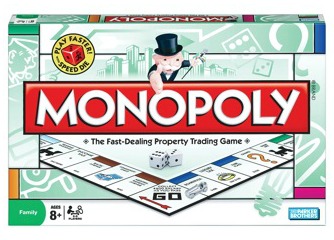Some children seem to have no sense of numbers. Concepts such as size escape them and they struggle to distinguish differing amounts. Children with poor number sense may have to rethink basic mathematical operations such as addition or subtraction each time they need to use them. They often have difficulty comparing one thing to another or making estimations. Many children who have trouble with numbers benefit from hands-on and visual tools that can help them understand mathematical concepts and relationships. They may even benefit greatly from games and apps like those we recommend at LearningWorks for Kids. In this edition of the Beyond Games series, we provide a few strategies that can help improve your child’s number sense.
Practice, practice, practice with different materials and tools. Many struggling math students seem to learn something one day only to forget it the next. It is important that they are able to apply what they have learned in one setting with one set of tools to other situations. This can be accomplished by repeated practice as well as varying practice with different tools and approaches. After “memorizing” multiplication tables, a child might cement this concept through the manipulation of Matchbox cars, stuffed animals, or Lego pieces. Help them bake lots of small cookies to use in practicing math concepts like addition or subtraction (before eating them) or draw stick figures on large pieces of construction paper to demonstrate mathematical operations. It is very easy to make up engaging real-life exercises that help them visualize and master math skills.
Accompany explanations of math computations with manipulatives or concrete examples. This goes hand-in-hand with the above. Many children who struggle to visualize abstract concepts in math benefit from using hands-on materials to make these concepts stick. Verbal explanations may not be enough for a child to fully grasp an idea, especially if he has trouble communicating about math. The use of hands-on materials and manipulatives could help make things clearer for him and make it easier for him to discuss what he is learning. Communicate with his teacher about the kinds of manipulatives that are being used for math in the classroom and use the same kinds of objects at home. Keeping things constant and familiar might help him relate the math he learns and practices in school to math practice at home.
Emphasize a child’s learning strengths when doing math work. Children learn in many different ways, and it is important to capitalize on different learning strengths. Suggest that she represent her math work in ways that make the most sense to her, such as drawing pictures, making tables, or writing explanations. If she is struggling with showing her work on a particular math assignment, encourage her to try a different way. Drawing a picture before writing out an equation could help her see the first step to solving the problem. Set up a meeting with her teacher if she appears to understand her math but is not able to show the kind of work the teacher expects. This can go a long way toward reducing her frustration with math in the classroom.
Practice collecting and analyzing data. Children are often asked to analyze data and information at school, some of which they collect themselves. Family activities and outings, hobbies and interests, daily routines at home present great opportunities to practice collecting data outside of the classroom. Children with difficulty in deriving meaning from data sets can benefit greatly from this. Have him practice collecting numbers and making meaning from them by thinking of survey questions to ask family members or friends. He could inquire as to favorite foods, television shows, season of choice, or preferred video games and keep track of responses. Then have him create a table or graph to represent which answers were the most popular. Ask him questions about the information and encourage him to ask you questions based on the results of the survey question.
[cjphs_content_placeholder id=”73597″ random=”no” ]This may be a Beyond Games post, but there is no denying the power of play to help cement real world skills and help children learn. If you’re looking to strengthen your child’s math skills, here are some great games to play:
 Even in this digital world, some board games are timeless. Families can still have fun and encourage math skill-building and awareness by playing Monopoly together. This is a great game to practice simple math skills. Have your child be the banker or assistant banker to be sure she has a hand in all transactions. Monitor your own Monopoly finances and choices out loud, with musings like, “I have $500, so if I buy Boardwalk for $400, I’ll only have $100 left.” During the game, see if you can get her to estimate who is in the best monetary situation or who owns the most in assets. Ask her what she considered in order to answer this question and let her know what you yourself would think about to formulate an answer to the same question.
Even in this digital world, some board games are timeless. Families can still have fun and encourage math skill-building and awareness by playing Monopoly together. This is a great game to practice simple math skills. Have your child be the banker or assistant banker to be sure she has a hand in all transactions. Monitor your own Monopoly finances and choices out loud, with musings like, “I have $500, so if I buy Boardwalk for $400, I’ll only have $100 left.” During the game, see if you can get her to estimate who is in the best monetary situation or who owns the most in assets. Ask her what she considered in order to answer this question and let her know what you yourself would think about to formulate an answer to the same question.
![]() Paladog is a mobile action game that helps players build estimation skills and a sense of quantity. Players are tasked with monitoring food levels so that troops can be summoned, monitoring the overall health of self and of enemies, and ensuring “mana” levels are adequate to execute magic spells. Failure to keep track of just one of these elements can spell defeat. Successful players are those who effectively manage their money. Budgeting currency is essential to success in the game.
Paladog is a mobile action game that helps players build estimation skills and a sense of quantity. Players are tasked with monitoring food levels so that troops can be summoned, monitoring the overall health of self and of enemies, and ensuring “mana” levels are adequate to execute magic spells. Failure to keep track of just one of these elements can spell defeat. Successful players are those who effectively manage their money. Budgeting currency is essential to success in the game.
 Math vs. Zombies If your child is into the popular Plants vs. Zombies, this is a great choice to help him practice math skills in a relatively familiar game setting. For Android and iOS devices, Math vs. Zombies presents a fun and funky game setting that requires the completion of simple math problems of increasing difficulty in order to progress. Quick and accurate execution of math equations is the key to success here.
Math vs. Zombies If your child is into the popular Plants vs. Zombies, this is a great choice to help him practice math skills in a relatively familiar game setting. For Android and iOS devices, Math vs. Zombies presents a fun and funky game setting that requires the completion of simple math problems of increasing difficulty in order to progress. Quick and accurate execution of math equations is the key to success here.
 Sushi Monster is a game created by Scholastic, leaving no question as to its educational worth. The game helps develop addition, subtraction, and multiplication skills, awarding higher scores for faster completion. The game calls for quick strategizing and mental computation, and its fun premise and graphics will quickly engage your child.
Sushi Monster is a game created by Scholastic, leaving no question as to its educational worth. The game helps develop addition, subtraction, and multiplication skills, awarding higher scores for faster completion. The game calls for quick strategizing and mental computation, and its fun premise and graphics will quickly engage your child.
![]() Slice It! is a game that helps children visualize concepts in geometry in a more rewarding setting than they might find in the classroom. Players have as much time as the outside world allows to get things right, and starting over is always an option, relieving the pressure that a school environment can place on children to grasp concepts in geometry at the same pace as their peers.
Slice It! is a game that helps children visualize concepts in geometry in a more rewarding setting than they might find in the classroom. Players have as much time as the outside world allows to get things right, and starting over is always an option, relieving the pressure that a school environment can place on children to grasp concepts in geometry at the same pace as their peers.
To find more games and apps to help your child build important math skills, visit the LearningWorks for Kids Playbook archive. For recently published posts about improving your child’s math skills, see 5 More Ways to Improve Working Memory and Math, and the latest in our Beyond Games series, Make Real World Math More Interesting.




